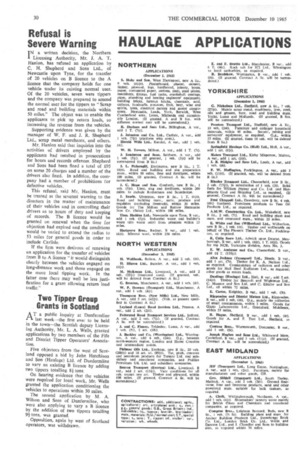Refusal is Severe Warning
Page 32

If you've noticed an error in this article please click here to report it so we can fix it.
IN a written decision, the Northern 1 Licensing Authority, Mr. J, A. T. Hanlon, has refused an application by
C. H. Shepherd and Sons Ltd., of Newcastle upon Tyne, for the transfer of 20 vehicles on B licence to the A licence that the company holds for one vehicle under its existing normal user. Of the 20 vehicles, seven were tippers and the company was prepared to amend the normal user for the tippers to "Scrap and road and building materials within 50 miles." The object was to enable the applicants to pick up return loads, so increasing the revenue from the vehicles.
Supporting evidence was given by the manager of W. F. and J. R. Shepherd Ltd., scrap metal merchants, and others.
Mr. Hanlon said that inquiries into the activities of drivers employed by the applicants had resulted in prosecutions for hours and records offences. Shepherd and Sons had been fined a total of £95 on some 20 charges and a number of the drivers also fined. In addition, the company had a number of prohibitions for defective vehicles.
This refusal, said Mr. Hanlon, must be treated as the severest warning to the directors in the matter of maintenance of their vehicles and in controlling their drivers as to hours of duty and keeping of records. The B licence would be granted on renewal when the time for objection had expired and the conditions would be varied to extend the radius to 53 miles for general goods in order to include Carlisle.
If the firm were desirous of renewing an application for the transfer of vehicles from B to A licence "it would distinguish clearly between the vehicles engaged on long-distance work and those engaged on the more local tipping work. In the latter case there may well be less justification for a grant allowing return load traffic."




























































































































